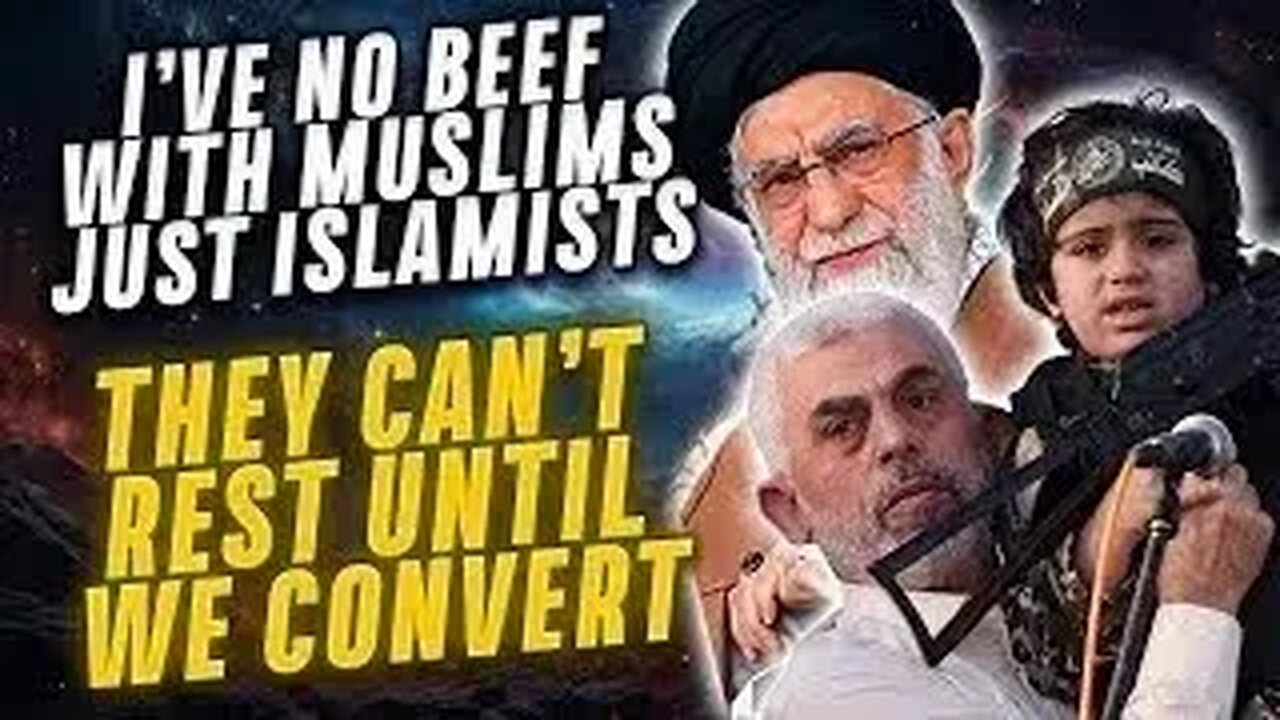Premium Only Content

There is a Huge Difference Between Muslims & Islamists
Islamist terrorists and ordinary Muslims represent two contrasting interpretations of Islam, influencing both historical contexts and contemporary society, particularly in the UK and Europe:
Islamist Terrorists: From the late 20th century onwards, Islamist extremism has often been associated with groups like ISIS, Al-Qaeda, and others who interpret Islam to justify violence for political or ideological ends. Their actions are rooted in a radical reinterpretation of Islamic texts, promoting a form of jihad that involves a violent struggle to establish a caliphate or enforce Sharia law. This movement gained significant attention post-9/11, leading to widespread security concerns and policy changes aimed at countering terrorism. Their ideology often rejects modern, secular governance, aiming instead for a theocratic state, which they believe can be achieved through what they term as 'offensive jihad'.
Ordinary Muslims: Conversely, the vast majority of Muslims practice Islam as a religion advocating peace, community, and personal spiritual growth, focusing on the Five Pillars of Islam. For them, jihad primarily signifies an internal or spiritual struggle, not warfare against others. This interpretation aligns with global values of coexistence and integration into diverse societies. Ordinary Muslims often face the backlash of Islamophobia due to the actions of extremists, despite condemning terrorism and viewing it as a perversion of their faith.
Impact on Society and Policy in the UK and Europe: Over the past decades, especially since 9/11 and subsequent attacks in Europe, there's been an increase in security measures and policy debates on immigration, integration, and multiculturalism. These incidents have sometimes led to societal tensions, with spikes in Islamophobia and challenges in policy-making that attempt to balance security with human rights and community cohesion. The radicalization of individuals has been linked to broader socio-economic issues, identity crises, and geopolitical grievances, sparking discussions on how to address these root causes without alienating Muslim communities.
Public Perception and Media Influence: Media portrayal often simplifies jihad to mean only violence, ignoring its broader, peaceful connotations within Islam, contributing to a 'myth of jihad' where the term is predominantly associated with terrorism. This has shaped public perception, sometimes leading to a general mistrust towards Muslim communities, despite the efforts of many Muslims to counteract extremist narratives through community resilience and interfaith dialogue.
This stark contrast not only shapes policy but also the daily lives of Muslims who strive to practice their faith in harmony, often under scrutiny due to the actions of a radical minority.
-
 9:41
9:41
The Problem With Being Awake
9 months agoThe Cobra Effect: How It Fuels the Global Anti-Racism Money Machine
1.13K -
 1:31:18
1:31:18
Graham Allen
5 hours agoErika Fights Back: Vows To EXPOSE TRUTH & DEMANDS Trial Goes Public!! Left Says Her Grief Is FAKE!
130K81 -
 2:08:47
2:08:47
Badlands Media
9 hours agoBadlands Daily: November 3, 2025 – Tariff Wars, SNAP Panic & Brennan Gets Confronted
53.9K15 -
 2:59:32
2:59:32
Wendy Bell Radio
8 hours agoThings Will Get Worse Before They Get Better
92.4K110 -
 1:18:28
1:18:28
The Big Mig™
5 hours agoICE Will Use Private Bounty Hunters, LFG
20.1K13 -
 1:08:17
1:08:17
Chad Prather
11 hours agoHow to Get Along With People You Don’t Even Like (Most of the Time)
126K34 -
 1:45:29
1:45:29
MTNTOUGH Podcast w/ Dustin Diefenderfer
11 hours agoTaya + Colton Kyle: Can American Marriages Survive 2025? | MTNPOD #140
32.1K -
 1:12:23
1:12:23
MikeMac - Say Something
19 hours agoSay Something Beyond W/MikeMac: JOKER - Ep.12
25.6K1 -
 1:30:13
1:30:13
Game On!
17 hours ago $10.53 earnedChiefs Dynasty OVER, New Longest FG RECORD, and Patriots Are Winning The Super Bowl!
48.3K4 -
 4:02:17
4:02:17
The Bubba Army
3 days agoIS AMERICA OVER TRUMP? - Bubba the Love Sponge® Show | 11/03/25
101K37